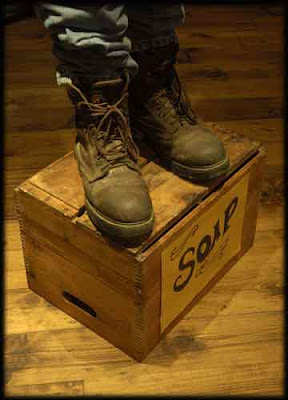Soap

A recent headline in the Traverse City Record-Eagle proclaimed, “Local man plans to get back on his soap box.” This prompted some questions on the origin of the term soap box.
First of all, there’s the word soap. In a reversal of the usual historical direction, it seems to have worked its way into Latin as sapo. Originally, it came from Teutonic or Tartar languages.
Literally, a soap box was a wooden crate used to deliver soap. Empty, it made a convenient platform to raise a speaker slightly above his audience so that he might be seen and heard. Since many of these public speakers embraced eccentric or quirky ideas, and since they usually employed a passionate style of oratory, to get on your soapbox took on a pejorative cast.
The soapbox derby was so named because a wooden crate originally formed the riding compartment of the vehicle. (Derby takes its name from the 12th Earl of Derby who first held the race that takes place near the town of Epsom in Surrey.)
To soft soap someone is to employ flattery in an unctuous way. The OED gives an instance from 1830: “I will not use the vulgar phrase, and say he has been pouring soft soap down the backs of the New York delegation.” [Register of Congressional Debates]
The sponsors of daytime dramas on the radio tended to be soap and detergent companies such as Procter & Gamble or Colgate-Palmolive-Peet. This lead to the term soap opera.
Finally, soap was an American slang term in the 19th century that meant money. When we deny a request by saying no soap, it translates as “nothing doing,” but originally it probably meant something like “I don’t have any change to spare.”
SIDEBAR: saponification
NOTE: Thank you to the anonymous reader who corrected me on the source of Derby by sending me here: http://www.epsomdowns.co.uk/History.ink


Comments